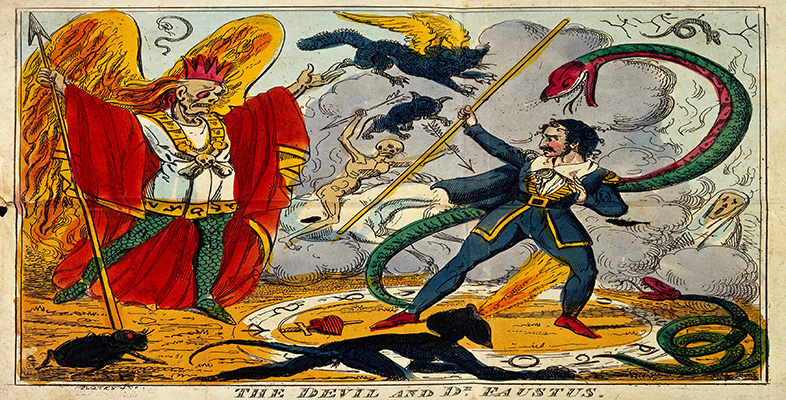2.4 Act 5, Scene 2: Faustus's last soliloquy
The play draws to a close with Faustus's final soliloquy, which is supposed to mark the last hour of his life.
Activity
Please reread this speech now, thinking as you read about how Marlowe uses sound effects to heighten the emotional impact of the soliloquy.
Discussion
The soliloquy represents an attempt to imagine and dramatise what the last hour of life feels like to a man awaiting certain damnation. Of course, the speech doesn't really take an hour to deliver, but Marlowe uses the sound of the clock striking to create the illusion that the last hour of Faustus's life is ticking away and so heightens the sense of impending doom. It strikes eleven at the start of the speech, then half past the hour 31 lines later, then midnight only twenty lines after that. Why does the second half hour pass much more quickly than the first? Is this Marlowe's way of conveying what the passage of time feels like to the terrified Faustus: it seems to be speeding up as the dreaded end approaches? The thunder and lightning that swiftly follow the sound of the clock striking midnight announce the final entrance of the devils.
Critics have often commented on how skilfully Marlowe uses rhythm to underline the passage of time. Look, for example, at the second line: ‘Now hast thou but one bare hour to live’ (l. 67). Because this is a sequence of monosyllabic words, it is not entirely clear which of them are stressed. It would certainly be possible for an actor to give a more or less equally strong stress to each word, which is why O'Connor points out that the line seems to echo the striking clock we have just heard (p. 108). This echo effect is strengthened by the internal rhyme between ‘Now’ and ‘thou’. The monosyllabic words continue into the next line until the last word: ‘And then thou must be damned perpetually’ (l. 68). The sudden appearance of a long five-syllable word focuses our attention on it and alerts us to what it is that Faustus most fears: an infinity of suffering. This sparks his desperate and futile plea for time to stand still, and Marlowe underlines the futility through the use of enjambement, or run-on lines:
Fair nature's eye, rise, rise again, and make
Perpetual day; or let this hour be but
A year, a month, a week, a natural day … (ll. 71–3)
Faustus wants time to stop or slow down, but the way one line of verse tumbles into the next, accelerating rather than slowing down the rhythm, seems to signal the inevitable frustration of that wish. Faustus himself grasps this: ‘The stars move still; time runs; the clock will strike; / The devil will come, and Faustus must be damned’ (ll. 76–7).
Time really is the essence of this soliloquy, not only because the clock is ticking for Faustus, but because, as we have seen, what most horrifies him is the prospect not of suffering but of endless suffering. After the clock strikes the half hour, Faustus pleads with God to place a limit on his time in hell – ‘Let Faustus live in hell a thousand years, / A hundred thousand, and at last be saved’ (ll. 103–04) – only to come back to the awful truth: ‘O, no end is limited to damnèd souls’ (l. 105).
One of the most striking aspects of the speech is the way it reverses the dreams of power and glory that Faustus expressed in his first soliloquy. In that speech he declared his desire to be more than human, to be a ‘mighty god’, but now, as he faces an eternity in hell, he wishes that he were less than human: he longs to be transformed into ‘some brutish beast’ whose soul would simply dissolve into the elements when it dies (ll. 109–12), or that his soul might ‘be changed into little waterdrops, / And fall into the ocean, ne'er be found’ (ll. 119–20). In his final soliloquy, Faustus's self-assertive spirit collapses into a desire for extinction; his aspiration to divinity into a longing for annihilation as he seeks desperately to escape from ‘the heavy wrath of God’ (l. 86).
Does this final humbling of Faustus encourage a feeling of satisfaction that he has got what he deserved? That seems to be how the Epilogue sees things. As in the Prologue, the Chorus begins by acknowledging Faustus's greatness, but in essence it is issuing a warning to the audience that his terrible fate is what awaits all those ‘forward wits’ who ‘practise more than heavenly power permits’ (ll. 7–8). Yet it is arguable that the final soliloquy's powerful evocation of Faustus's agony, coupled with its stress on the horrors of the never-ending suffering to which he has been sentenced, are designed to make us wonder whether the savage punishment really fits the crime. Feelings of pity and fear might seem a more appropriate response to Faustus's end than the Epilogue's moral, as tidy as its concluding rhyming couplet.
